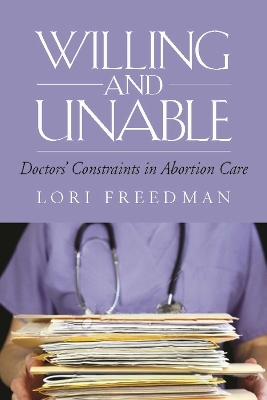
Willing and Unable
Seiten
2010
Vanderbilt University Press (Verlag)
978-0-8265-1715-9 (ISBN)
Vanderbilt University Press (Verlag)
978-0-8265-1715-9 (ISBN)
Exploring the social world where abortion politics and mainstream medicine collide, the author interviews obstetricians and gynecologists around the U.S. to find out why physicians rarely integrate abortion into their medical practice. While abortion stig
Explores the social world where abortion politics and mainstream medicine collide. The author interviewed physicians of obstetrics and gynecology around the United States to find out why physicians rarely integrate abortion into their medical practice. While abortion stigma, violence, and political contention provide some explanation, her findings demonstrate that willing physicians are further encumbered by a variety of barriers within their practice environments. Structural barriers to the mainstream practice of abortion effectively institutionalize the buck-passing of abortion patients to abortion clinics. As the author notes, ""Public-health-minded HMOs and physician practices could significantly change the world of abortion care if they stopped outsourcing it."" Drawing from forty in-depth interviews, the book presents a challenge to a commonly held assumption that physicians decide whether or not to provide abortion based on personal ideology. Physician narratives demonstrate how their choices around learning, doing, and even having abortions themselves disrupt the pro-choice/pro-life moral and political binary.|Willing and Unable explores the social world where abortion politics and mainstream medicine collide. The author interviewed physicians of obstetrics and gynecology around the United States to find out why physicians rarely integrate abortion into their medical practice. While abortion stigma, violence, and political contention provide some explanation, her findings demonstrate that willing physicians are further encumbered by a variety of barriers within their practice environments. Structural barriers to the mainstream practice of abortion effectively institutionalize the buck-passing of abortion patients to abortion clinics. As the author notes, ""Public-health-minded HMOs and physician practices could significantly change the world of abortion care if they stopped outsourcing it."" Drawing from forty in-depth interviews, the book presents a challenge to a commonly held assumption that physicians decide whether or not to provide abortion based on personal ideology. Physician narratives demonstrate how their choices around learning, doing, and even having abortions themselves disrupt the pro-choice/pro-life moral and political binary.
Explores the social world where abortion politics and mainstream medicine collide. The author interviewed physicians of obstetrics and gynecology around the United States to find out why physicians rarely integrate abortion into their medical practice. While abortion stigma, violence, and political contention provide some explanation, her findings demonstrate that willing physicians are further encumbered by a variety of barriers within their practice environments. Structural barriers to the mainstream practice of abortion effectively institutionalize the buck-passing of abortion patients to abortion clinics. As the author notes, ""Public-health-minded HMOs and physician practices could significantly change the world of abortion care if they stopped outsourcing it."" Drawing from forty in-depth interviews, the book presents a challenge to a commonly held assumption that physicians decide whether or not to provide abortion based on personal ideology. Physician narratives demonstrate how their choices around learning, doing, and even having abortions themselves disrupt the pro-choice/pro-life moral and political binary.|Willing and Unable explores the social world where abortion politics and mainstream medicine collide. The author interviewed physicians of obstetrics and gynecology around the United States to find out why physicians rarely integrate abortion into their medical practice. While abortion stigma, violence, and political contention provide some explanation, her findings demonstrate that willing physicians are further encumbered by a variety of barriers within their practice environments. Structural barriers to the mainstream practice of abortion effectively institutionalize the buck-passing of abortion patients to abortion clinics. As the author notes, ""Public-health-minded HMOs and physician practices could significantly change the world of abortion care if they stopped outsourcing it."" Drawing from forty in-depth interviews, the book presents a challenge to a commonly held assumption that physicians decide whether or not to provide abortion based on personal ideology. Physician narratives demonstrate how their choices around learning, doing, and even having abortions themselves disrupt the pro-choice/pro-life moral and political binary.
Lori R. Freedman is a sociologist at ANSIRH, a program of the Bixby Center for Global Reproductive Health at the University of California, San Francisco.
| Erscheint lt. Verlag | 9.8.2010 |
|---|---|
| Zusatzinfo | index, references |
| Verlagsort | Tennessee |
| Sprache | englisch |
| Maße | 152 x 223 mm |
| Gewicht | 315 g |
| Themenwelt | Medizin / Pharmazie ► Gesundheitswesen |
| Studium ► 1. Studienabschnitt (Vorklinik) ► Anatomie / Neuroanatomie | |
| Sozialwissenschaften ► Soziologie | |
| ISBN-10 | 0-8265-1715-3 / 0826517153 |
| ISBN-13 | 978-0-8265-1715-9 / 9780826517159 |
| Zustand | Neuware |
| Haben Sie eine Frage zum Produkt? |
Mehr entdecken
aus dem Bereich
aus dem Bereich
Buch | Hardcover (2022)
Urban & Fischer in Elsevier (Verlag)
CHF 307,95
Struktur und Funktion
Buch | Softcover (2021)
Urban & Fischer in Elsevier (Verlag)
CHF 61,60
+ Web + Lehrbuch
Buch | Hardcover (2022)
Urban & Fischer in Elsevier (Verlag)
CHF 348,55


